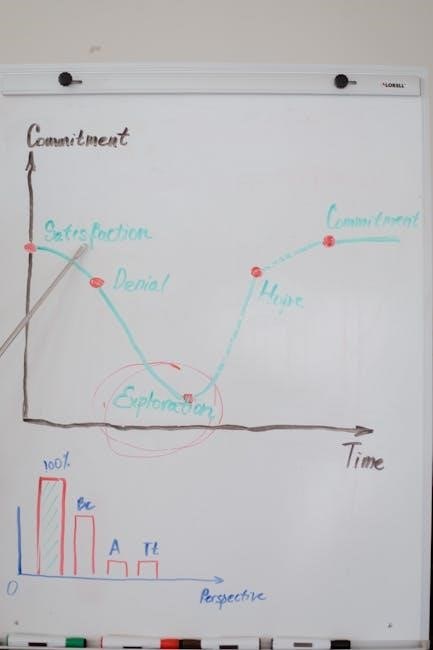The NJ CBT-100 form is essential for corporations to file their business taxes accurately․ Electronic filing is mandatory‚ ensuring compliance with state tax regulations․ Visit the NJ Division of Taxation website for detailed guidance and updates․
Overview of the CBT-100 Form
The CBT-100 form is used by corporations to file their New Jersey Corporation Business Tax returns; It is mandatory to file electronically‚ as paper submissions are no longer accepted․ The form covers income‚ deductions‚ and credits‚ ensuring compliance with state tax laws․ Recent updates include changes for banking corporations and financial businesses‚ which now use the CBT-100 instead of Form BFC-1․ The form also supports combined reporting‚ required since Tax Year 2019․ Visit the NJ Division of Taxation website for the latest instructions and resources to ensure accurate filing․
Importance of Understanding the Instructions
Understanding the NJ CBT-100 instructions is crucial for accurate and timely filing of Corporation Business Tax returns․ The instructions provide detailed guidance on tax calculations‚ deductions‚ and electronic filing requirements․ Failure to comply with these guidelines can result in penalties‚ delays‚ or additional tax liabilities․ Recent changes‚ such as mandatory electronic filing and combined reporting‚ emphasize the need to stay informed․ Properly interpreting the instructions ensures adherence to state tax laws and avoids common pitfalls․ Consulting the NJ Division of Taxation resources is essential for navigating these requirements effectively and maintaining compliance․

What is the CBT-100 Form?
The CBT-100 form is used by corporations to file New Jersey Corporation Business Tax returns․ It requires electronic submission and adherence to specific state tax regulations․
Purpose of the Form
The CBT-100 form is designed for corporations to report their income‚ calculate tax liability‚ and claim applicable deductions and credits․ It ensures compliance with New Jersey’s Corporation Business Tax laws․ Electronic filing is mandatory‚ and the form must be submitted with accurate financial details to avoid penalties․ Corporations use this form to detail their taxable income‚ apply tax credits‚ and remit payments․ Adherence to state tax regulations is crucial for proper filing and to maintain legal compliance․ The form is a key component of New Jersey’s tax system for businesses․
Who Needs to File the CBT-100?
The CBT-100 form is required for corporations subject to New Jersey’s Corporation Business Tax․ This includes banking corporations and financial business corporations that previously filed Form BFC-1․ All corporations operating in New Jersey must file this form to report their income and calculate tax liability․ Combined reporting is mandatory for certain entities‚ ensuring accurate tax calculations․ Electronic filing is required for all submissions‚ and corporations must adhere to state tax regulations․ Failure to file may result in penalties‚ emphasizing the importance of compliance with New Jersey’s tax requirements․
Key Changes in Recent Years
Recent updates to the NJ CBT-100 instructions include mandatory electronic filing for all Corporation Business Tax returns‚ starting with Tax Year 2019․ Banking corporations and financial business corporations now use Form CBT-100 instead of Form BFC-1․ Combined reporting is also required for certain entities‚ ensuring accurate tax calculations․ Additionally‚ all payments must be made electronically․ These changes aim to streamline the filing process and improve compliance with state tax regulations․ Corporations must adapt to these updates to avoid penalties and ensure timely submissions․

Electronic Filing Requirements
New Jersey mandates electronic filing for CBT-100‚ CBT-100S‚ and CBT-100U forms․ All payments must be made electronically starting January 1‚ 2019․ A PIN is required for secure filing․
Mandatory Electronic Filing
New Jersey requires all Corporation Business Tax (CBT) returns‚ including CBT-100‚ CBT-100S‚ and CBT-100U‚ to be filed electronically․ Paper returns are no longer accepted․ Electronic filing ensures compliance with state tax regulations and streamlines the process․ To file electronically‚ taxpayers must obtain a Personal Identification Number (PIN) from the NJ Division of Taxation․ This PIN can be found on the REG-C form or the ST-50/51 Sales and Use Tax coupon booklet․ Electronic filing is mandatory for all payments made on or after January 1‚ 2019․
Benefits of Electronic Filing
Electronic filing for the NJ CBT-100 offers numerous advantages‚ including faster processing‚ reduced errors‚ and improved accuracy․ It eliminates the need for paper submissions‚ saving time and resources․ Taxpayers receive immediate confirmation of submission‚ ensuring peace of mind․ Electronic filing also supports environmental sustainability by reducing paper usage․ Additionally‚ it streamlines record-keeping‚ as filings are stored digitally․ The NJ Division of Taxation provides a secure and user-friendly platform for electronic submissions‚ making the process efficient and straightforward․ This method is mandatory for all CBT returns‚ ensuring compliance with state tax regulations․
How to Obtain a PIN for Filing
To obtain a PIN for filing the NJ CBT-100‚ taxpayers can locate it on the REG-C form provided with their NJ-927 Quarterly Employer Report or in the ST-50/51 Sales and Use Tax coupon booklet․ The PIN is also available on the CBT-100 instructions or through the NJ Division of Taxation website․ Ensure the PIN is entered correctly during electronic filing to avoid delays․ For assistance‚ contact the NJ Division of Taxation customer service․ This step is crucial for secure and efficient filing‚ as the PIN verifies the taxpayer’s identity and ensures compliance with state tax requirements․
Combined Reporting Requirements
Combined reporting requires corporations to include income from multiple entities in a single tax return․ New Jersey mandates this for certain groups‚ ensuring accurate tax liability calculation․
What is Combined Reporting?
Combined reporting is a method where corporations include income from multiple entities in a single tax return․ New Jersey mandates this for certain groups to ensure accurate tax calculations․ It prevents tax avoidance by treating related businesses as one unit․ This approach aligns with modern tax regulations and applies to corporations operating within the state․ The requirement started in Tax Year 2019‚ streamlining tax filings and ensuring fairness in taxation․ Understanding combined reporting is crucial for compliance with NJ CBT-100 instructions and avoiding penalties․
Eligibility for Combined Reporting
Eligibility for combined reporting applies to corporations with common ownership or control‚ typically exceeding 50% ownership․ This includes both in-state and out-of-state entities meeting specific nexus standards․ Corporations must file together if they are part of a unitary business or share centralized management․ Eligibility ensures fair taxation by preventing income shifting․ Entities leaving a combined group must file separately unless joining another group․ This requirement streamlines tax filings and aligns with New Jersey’s efforts to prevent tax avoidance․ Understanding eligibility is crucial for accurate CBT-100 submissions and compliance with state tax regulations․
Impact on Tax Calculations
Combined reporting significantly impacts tax calculations by requiring corporations to aggregate income from all eligible entities․ This prevents income shifting and ensures fair taxation․ Corporations must allocate income based on specific apportionment methods‚ such as sales‚ property‚ or payroll․ Accurate reporting is crucial to avoid discrepancies․ Combined reporting also simplifies tax filings for groups operating as a single business unit․ Understanding these calculations is essential for compliance and ensuring accurate tax submissions․ Proper documentation and adherence to NJ tax regulations are vital to avoid penalties and ensure correct tax liability assessment․
Structure of the CBT-100 Form
The CBT-100 form includes sections for income‚ deductions‚ and credits․ Attachments and schedules are required for detailed reporting․ Proper completion ensures accurate tax submissions․
Sections of the Form
The CBT-100 form is divided into key sections‚ including income‚ deductions‚ and credits․ It also requires detailed attachments and schedules‚ such as Schedule A for adjustments and Schedule K-1 for shareholder information․ Proper completion of each section ensures accurate reporting of corporate income and tax liability․ Attachments provide additional details‚ while schedules break down complex calculations․ Understanding each section is crucial for compliance with New Jersey tax regulations․ Ensure all required documentation is included to avoid delays or penalties․ Refer to the official instructions for specific guidance on completing each part of the form accurately․
Key Fields and Their Meanings
The CBT-100 form includes essential fields such as total income‚ deductions‚ and credits․ These fields are critical for calculating tax liability․ For example‚ the “Total Income” field summarizes all taxable income‚ while “Deductions” reduce taxable income․ Credits directly lower the tax owed․ Other key fields include “Net Loss” and “Taxable Income‚” which are vital for accurate calculations․ Properly completing these fields ensures compliance with tax regulations․ Understanding each field’s purpose is essential for avoiding errors and penalties․ Refer to the instructions for detailed explanations of each field to ensure accurate reporting and compliance with New Jersey tax laws․
Attachments and Schedules
When filing the CBT-100‚ certain attachments and schedules are required to ensure accurate tax reporting․ Key schedules include Schedule A (Income and Deductions) and Schedule B (Adjustments and Credits)․ Additional forms like Form CBT-100-X for amended returns may be necessary․ All required documentation must be attached to avoid processing delays․ Ensure schedules are completed accurately and submitted alongside the main form․ Failure to include necessary attachments may result in incomplete filing or penalties․ Refer to the instructions for a detailed list of required schedules and forms to ensure compliance with New Jersey tax regulations․

Calculating Tax Liability
Understanding tax rates‚ deductions‚ and credits is crucial for accurate tax liability calculation․ Special considerations apply to certain industries‚ ensuring compliance with New Jersey tax regulations․
Understanding Tax Rates
Understanding tax rates is critical for accurate CBT-100 filings․ New Jersey imposes a corporation business tax with rates varying based on income․ The base tax rate is 6․5% for taxable income between $50‚000 and $100‚000‚ rising to 7․5% for income exceeding $100‚000․ Combined reporting entities must consider the unitary tax rate․ Additionally‚ certain industries or large corporations may face surtaxes or minimum taxes․ Staying informed about rate changes ensures compliance and accurate tax calculations․ Refer to the NJ Division of Taxation for the latest rate updates and specific industry adjustments․
Available Deductions and Credits
The CBT-100 form allows for various deductions and credits to reduce tax liability․ Common deductions include operating expenses‚ interest‚ and certain exemptions․ Credits may apply for research activities‚ economic development‚ or specific industries․ The Research and Development Tax Credit and the Economic Redevelopment and Growth Grant program are notable examples․ Additionally‚ unused credits can be carried forward to future tax years․ Filers should carefully review eligibility criteria and documentation requirements to maximize savings․ Consulting the NJ Division of Taxation resources ensures accurate application of deductions and credits‚ optimizing tax compliance and financial benefits․
Special Considerations for Certain Industries
Certain industries‚ such as banking corporations and financial businesses‚ must adhere to specific guidelines when filing the CBT-100․ These entities‚ previously filing Form BFC-1‚ now use CBT-100 for their returns․ Electronic filing is mandatory for all tax filings and payments․ Additionally‚ combined reporting requirements apply to corporations engaged in unitary business activities․ Industries with unique tax scenarios‚ such as research and development or economic development projects‚ may qualify for specialized credits․ Filers should carefully review industry-specific rules and consult NJ Division of Taxation resources to ensure compliance and accurately reflect their tax obligations․

Filing Deadlines and Extensions
The regular filing deadline for CBT-100 is April 15th․ Extensions can be requested electronically․ Missing deadlines may result in penalties․ Ensure timely submission to avoid issues․
Regular Filing Deadline
The regular filing deadline for the NJ CBT-100 form is April 15th of each year․ This deadline applies to both the tax return and any payment due․ Missing this deadline can result in penalties and interest․ Ensure all required documentation and payments are submitted by this date to avoid complications․ If the deadline falls on a weekend or holiday‚ the due date is the next business day․ Filers are encouraged to submit their returns early to allow time for corrections or additional information requests․ Timely filing helps maintain compliance and avoids unnecessary penalties․
How to Request an Extension
To request an extension for filing the NJ CBT-100‚ corporations must submit Form CBT-100-X electronically․ The extension period is typically 6 months‚ extending the deadline to October 15th․ Note that an extension only applies to the filing deadline‚ not the payment due date․ Any estimated taxes owed should be paid by the original April 15th deadline to avoid penalties and interest․ Visit the NJ Division of Taxation website for detailed instructions and to submit your extension request online․ Ensure you have a valid PIN for electronic filing․
Consequences of Missing Deadlines
Missing deadlines for filing the NJ CBT-100 can result in penalties and interest on unpaid taxes․ A late filing penalty of 5% of the unpaid tax may be applied for each month‚ up to 25%․ Additionally‚ a late payment penalty and interest on the outstanding balance will accrue․ Interest begins on the original due date and continues until the tax is paid․ Failure to file electronically or pay electronically may also result in a $200 penalty․ Repeated non-compliance could lead to further actions‚ including loss of tax benefits․ Consult the NJ Division of Taxation for specific details and to resolve any overdue filings․

Payment Instructions
Electronic payment is mandatory for CBT-100 filings․ Use a PIN from the REG-C form or ST-50/51 booklet․ Payment plans are available for tax owed‚ with penalties for late payments․
Electronic Payment Options
Electronic payment is mandatory for CBT-100 filings․ Taxpayers can use the New Jersey Division of Taxation’s online service‚ requiring a PIN from the REG-C form or ST-50/51 booklet․ Payments can be made via ACH debit or credit card․ Ensure timely payment to avoid penalties․ The PIN ensures secure transactions‚ and payments are processed promptly․ Visit the NJ Division of Taxation website for step-by-step guidance on electronic payment options and requirements․ This method streamlines the process and reduces errors‚ ensuring compliance with state tax regulations․
Payment Plans for Tax Owed
Taxpayers unable to pay their full CBT-100 liability can set up a payment plan with the NJ Division of Taxation․ This option allows businesses to pay owed taxes in installments․ To establish a plan‚ taxpayers must submit a request online or by phone‚ providing detailed financial information․ Once approved‚ payments are made electronically‚ and late payment penalties may still apply․ It’s crucial to adhere to the agreed-upon schedule to avoid additional fees or collection actions․ Visit the NJ Division of Taxation website for specific guidelines on setting up and managing a payment plan for unpaid taxes․
Penalties for Late Payment
Failure to pay taxes owed by the deadline results in penalties and interest․ New Jersey imposes a penalty of 5% of the unpaid tax for each month‚ up to 25%․ Interest accrues on both the unpaid tax and penalty․ Late payment can also lead to loss of tax benefits and potential collection actions․ Taxpayers are encouraged to address payment issues promptly to minimize penalties․ For specific details on late payment penalties‚ consult the NJ Division of Taxation website or contact their customer service for guidance on resolving tax debts effectively․
Amending a Return
Amending a return ensures accuracy and compliance․ Use Form CBT-100-X to correct errors or omissions․ Follow instructions carefully to avoid delays or penalties․
When to File an Amended Return
A corporation should file an amended return if there are errors or omissions in the original CBT-100 submission․ This includes incorrect tax calculations‚ missing or inaccurate information‚ or changes in business structure․ Use Form CBT-100-X to correct the return․ The amended filing is necessary to ensure compliance and avoid penalties․ File within 150 days of the original due date or upon notification from the state․ Ensure all corrections are clearly documented to avoid further issues; Timely amendments help maintain compliance with New Jersey tax regulations․
How to File Form CBT-100-X
To file Form CBT-100-X‚ access it through the NJ Division of Taxation website․ Complete the form accurately‚ ensuring all corrections are clearly documented․ Submit the amended return electronically via the NJ portal․ Include a detailed explanation of changes and attach supporting documentation if required․ Use your PIN for authentication․ Ensure the form reflects the correct tax period and is signed by an authorized representative․ Review for errors before submission to avoid delays․ Processing times vary‚ but timely filing helps maintain compliance with state tax regulations․ Follow the instructions carefully to ensure proper handling of your amendment․
Processing Time for Amendments
Processing times for amended returns vary‚ typically taking several months․ Electronic submissions are generally faster than paper filings․ Ensure all documentation is complete and accurate to avoid delays․ The NJ Division of Taxation prioritizes accurate and timely processing․ Check the status of your amendment through the NJ portal after 4-6 weeks․ Keep records of submission for reference․ Processing times may increase during peak tax seasons․ Plan accordingly to meet deadlines and avoid penalties․ Stay informed through official channels for updates on processing timelines and requirements․

Common Mistakes to Avoid
Avoid errors like incorrect or missing information‚ failure to file electronically‚ and missing deadlines․ Ensure all data is accurate and submissions are timely to prevent penalties․
Incorrect or Missing Information
Ensure all fields on the CBT-100 form are accurately completed․ Common errors include typos in EINs‚ business names‚ or addresses; Missing signatures or dates can delay processing․ Verify calculations for accuracy and ensure all required attachments are included․ Double-check PIN numbers for electronic filing to avoid rejection․ Incorrect tax periods or misreported income can lead to penalties․ Always review the form thoroughly before submission to prevent errors and ensure compliance with New Jersey tax regulations․
Failure to File Electronically
New Jersey requires mandatory electronic filing for CBT-100 forms․ Failure to comply may result in penalties and delayed processing․ Ensure you obtain a PIN for secure electronic submission․ The NJ Division of Taxation provides guidance on their website to facilitate smooth filing․ Avoid paper submissions to maintain compliance with state tax regulations․ Electronic filing ensures accuracy and timely processing‚ so it’s crucial to adhere to this requirement․ Visit the official website for step-by-step instructions and support to avoid issues related to non-electronic submissions․
Missing Deadlines or Payments
Missing deadlines or payments for the CBT-100 can result in penalties and interest․ The regular filing deadline is typically October 15th for corporations․ If unable to file on time‚ request an extension to avoid late fees․ Late payments will accrue penalties‚ so ensure timely submissions․ Use electronic filing to avoid delays and track payment status․ Failure to meet deadlines may lead to additional consequences‚ emphasizing the importance of staying informed and compliant․ Visit the NJ Division of Taxation website for guidance on extensions and payment options to maintain compliance and avoid financial penalties․
Resources and Support
Visit the NJ Division of Taxation website for detailed guidance‚ forms‚ and updates․ Contact customer service for assistance‚ and access additional publications for comprehensive support with CBT-100 filing․
NJ Division of Taxation Website
The NJ Division of Taxation website is a primary resource for CBT-100 filers‚ offering access to forms‚ instructions‚ and updates․ It provides detailed guidance on tax calculations‚ deductions‚ and electronic filing requirements․ Additionally‚ the site includes information on combined reporting‚ amendments‚ and payment options․ Users can find step-by-step instructions for completing the CBT-100 form‚ as well as resources for resolving common issues․ The website also features alerts‚ such as warnings about phishing scams‚ to help taxpayers stay informed and protected․ Visit the official site for the latest updates and comprehensive support for your CBT-100 filing needs․
Customer Service Contact Information
For assistance with the CBT-100 form‚ contact the NJ Division of Taxation customer service․ Visit their official website for phone numbers‚ email addresses‚ and mailing details․ Call their hotline for questions on filing‚ payments‚ or amendments․ Email support is also available for detailed inquiries․ Additionally‚ the Division provides a mailing address for submitting written requests or documentation․ Their office hours are typically Monday through Friday‚ and representatives are ready to help with tax-related concerns․ Utilize these resources to ensure accurate and timely filing of your CBT-100 return․
Additional Guidance and Publications
The NJ Division of Taxation offers comprehensive resources to aid in filing the CBT-100 form․ Visit their official website for detailed instruction booklets‚ tax bulletins‚ and user guides․ These publications provide step-by-step instructions‚ tax law explanations‚ and examples to ensure accurate filing․ Additionally‚ the Division publishes updates on tax law changes‚ combined reporting requirements‚ and electronic filing procedures․ Utilize these resources to stay informed and compliant with all CBT-100 filing obligations․ For the most current information‚ refer to the official NJ Division of Taxation website regularly․
The NJ CBT-100 instructions are crucial for accurate tax filings․ Utilize the NJ Division of Taxation’s resources for guidance‚ ensuring compliance and avoiding penalties․ Stay informed for filing success․
Final Tips for Filing Success
Ensure accuracy by double-checking all entries and calculations․ Verify eligibility for combined reporting and deductions․ Submit electronically with a valid PIN to avoid penalties; Attach all required schedules and documents․ Review the NJ Division of Taxation website for updates and resources․ Seek professional advice for complex cases․ Stay informed about tax law changes to maintain compliance․ Visit the official NJ tax portal for forms and guidance․ Avoid scams by verifying communication sources․ Plan ahead to meet deadlines and avoid late payment penalties․ Success lies in attention to detail and timely submissions․
Staying Informed About Tax Changes
Regularly visit the NJ Division of Taxation website for updates on tax laws and filing requirements․ Subscribe to newsletters and alerts to stay informed about changes affecting the CBT-100 form․ Review the latest instructions and forms‚ such as CBT-100 and CBT-100U‚ to ensure compliance․ Be aware of mandatory electronic filing and payment deadlines․ Check for scam alerts and verify communication sources to avoid phishing attempts․ Stay updated on combined reporting rules and eligibility criteria․ Timely updates help ensure accurate and compliant filings‚ avoiding penalties and delays․
